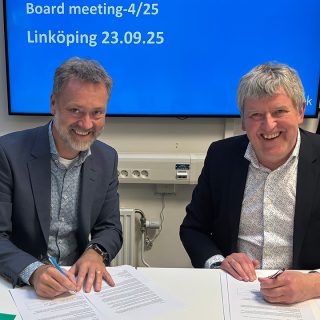The Industrial Doctoral School for Research and Innovation is one of the oldest and most wide-ranging industrial doctoral schools in the Nordic countries. Its aim is to strengthen collaboration between researchers and external organisations through joint doctoral projects, with shared funding from both sides.
Since its inception, more than 100 projects have been carried out in collaboration with over 70 external partners. Each year, between six and eight new doctoral students are admitted to the school.
“These projects have contributed to more relevant research and undergraduate education. At the same time, they create value for participating organisations and for society as a whole. But cross-sector collaboration also brings certain challenges,” says Patrik Rydén, Director of the Industrial Doctoral School.
IDS has a uniquely broad scope. Partners include private companies, public sector organisations and civil society actors, and the projects span all four faculties at the university: science and technology, medicine, social sciences, and humanities.
Doctoral students meet regularly, contributing to a rich exchange of knowledge. They gain insight into a variety of research areas while sharing the common experience of working with an external partner. A chemistry student researching environmental toxins, for example, may exchange ideas with a humanities student studying digital social work within the Church of Sweden.
“Discussing your research with someone from a completely different academic world is both useful and inspiring,” says doctoral student Lars Mattsson.
At IDS, all doctoral students are employed by the university – unlike at many other industrial doctoral schools. This arrangement gives them job security and shields them from changes within the partner organisation. All parties also benefit from clear legal agreements regarding confidentiality, publication rights, and intellectual property. However, the structure requires active engagement from all involved. Supervisors, students, and external partners must meet regularly to ensure two-way knowledge transfer and to foster engagement and buy-in from the organisations involved.
“We work systematically to build a strong culture of collaboration – for example, by conducting annual follow-ups with all partners and clarifying expectations from the outset. We also fund a three-month internship with the external partner to broaden networks and improve the doctoral student’s chances of future employment,” says Patrik Rydén.
The academic component includes a 15-credit course block focused on transferable skills, such as presentation techniques and entrepreneurship. The programme also features workshops and joint company visits to each other’s workplaces. Doctoral students highlight that these shared activities not only enhance their knowledge, but also provide new perspectives.
Helena Nydahl, who completed her doctorate in 2022 and now works as a sustainability strategist at an engineering company, reflects on her time in the doctoral school:
“The network was incredibly important – we learned so much from each other. We also got the chance to meet other companies, not just our own project partners, and to understand how profit-driven businesses view research and development, which can differ from the university’s perspective. And we had a great time together. Our projects were different, but we often faced similar challenges.”
Another doctoral student describes how the combination of academic research and practical application has been a rare and rewarding experience:
“Compared to other doctoral students, you gain a broader perspective – especially if, like me, you have the privilege of working in two physical environments. You build more contacts, discover new project opportunities and ideas, and you simply learn so much more,” says Rasmus Öberg.
Despite its many successes, IDS faces several challenges. One is developing courses that are both highly relevant to the students’ future careers and suitable for a group with widely varying backgrounds.
Another challenge is that not all positions are filled in every application round. This may be due to the fact that relatively few researchers at the university have experience or interest in working across traditional boundaries with external organisations. At the same time, some organisations may feel that taking on a doctoral project demands significant financial and staff resources.
Perhaps the greatest challenge, however, is achieving good matches between researchers and external partners.
“We need to rethink how we approach this. Universities must do more to highlight their unique expertise and how it can help solve the challenges faced by businesses and society. This has to happen through well-designed, cost-effective, and university-wide solutions,” says Patrik Rydén.





